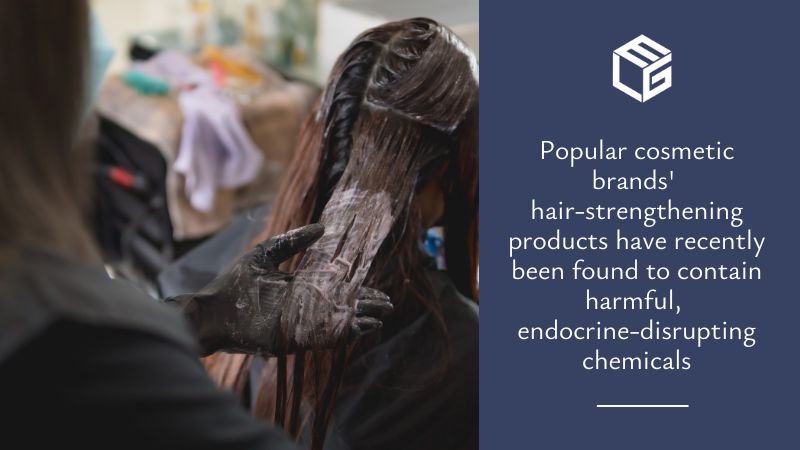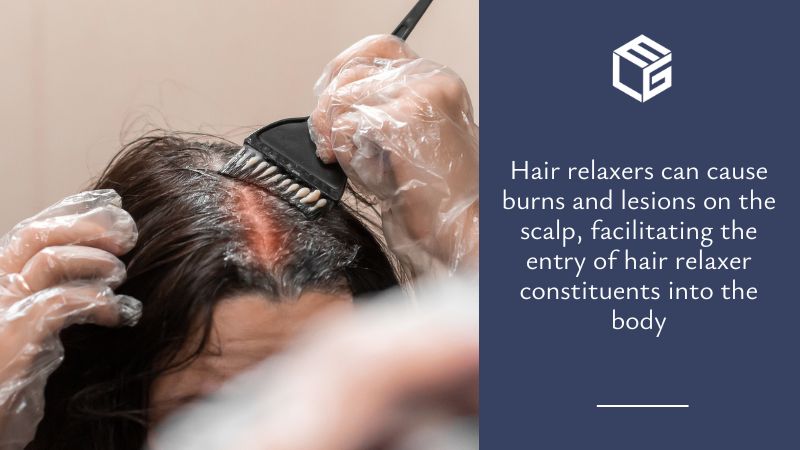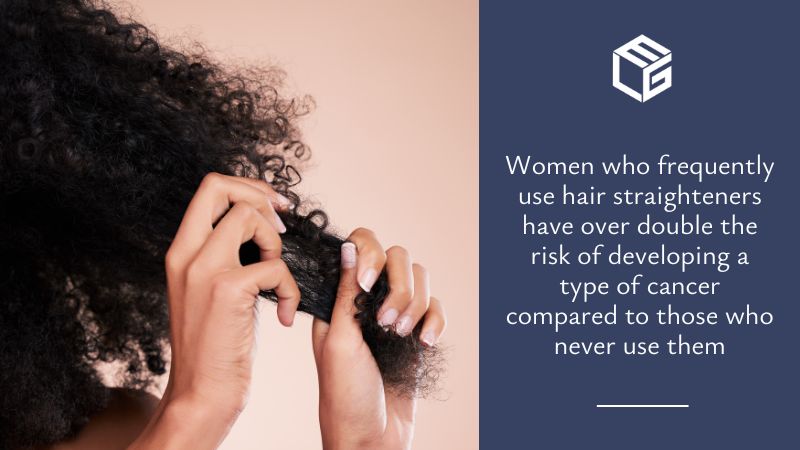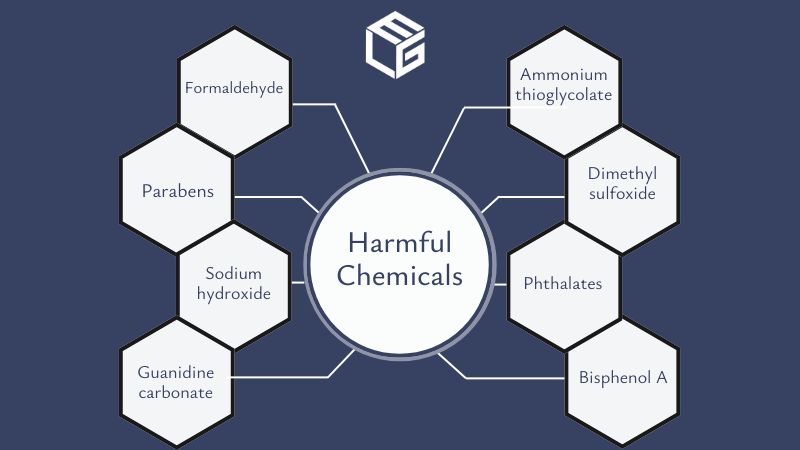Up to 80% of women who regularly use chemical hair relaxers are at risk of developing cancer
While the first hair relaxer was invented in 1909, these products only became popular among Black women at the end of the last century, as most actresses, models, and entertainers in the media chemically straightened their hair.
Today, hair relaxers are making a comeback, but at a price – women who frequently use these products are twice as likely to develop uterine cancer than those who do not.
According to a large National Institutes of Health study from 2022, women who never use hair relaxers have a 1.64% risk of developing uterine cancer, whereas those who regularly use these products have a 4.05% risk. Over the past decade, the incidence of uterine cancer has been on the rise in the United States, particularly among Black women. Approximately 60% of the participants who reported using chemical hair relaxers identified as Black women.
A study published in the American Journal of Epidemiology assessed the link between chemical hair relaxers and uterine fibroids, benign growths that appear in the uterus, in Black women. Out of the 23,580 participants, 7,146 developed uterine fibroids. Nearly 94% of the women reported using hair relaxers for at least one year, and the frequency of use ranged from 1-2 times per year to 7 times or more per year. Even though uterine fibroids do not increase the risk of uterine cancer, these findings suggest that most chemical hair relaxers on the market contain endocrine-disrupting chemicals, which contribute to the development of uterine fibroids.
If you have been using chemical hair relaxers and have one of the following diagnoses, you might be entitled to financial compensation from the responsible manufacturers:
- uterine cancer - endometrial cancer (type 1 strong association, type 2 unreliable association), uterine sarcoma - minimum latency period 5 years
- ovarian cancer - (non-serous tumors strong association, serous tumors) - latency period 15-20 years
With over 30 years of experience in toxic exposure and defective product cases, our attorneys will help you determine whether you are eligible to file a hair relaxer claim. There is strong medical evidence supporting a causal relation between the use of these products and the above cancers. Furthermore, if you qualify to file a toxic hair relaxer claim, our medical research team will make your case stronger by finding additional proof. It is important to know that although there is a link between hair relaxers and breast cancer, this diagnosis will not make you eligible for compensation.
Over 10 hair relaxer manufacturers have been named as defendants in lawsuits
There are at least 15 toxic hair relaxer personal injury lawsuits and 3 class action lawsuits pending across the country at the moment. The companies against which these lawsuits were filed include:
These are some of the chemical hair relaxers of the above companies the plaintiffs allege are responsible for their health problems:
Eligibility criteria for toxic hair relaxer claims
Everyone who has been using hair relaxers and developed uterine or ovarian cancer should get in touch with our attorneys, as they have the experience and skills to help. Eligibility requirements that must be met by an individual who intends to file a toxic hair relaxer claim:
- they must have been diagnosed with uterine cancer (endometrial cancer and uterine sarcoma), ovarian cancer (non-serous and serous tumors)
- they must have used chemical hair relaxer products for at least 2-5 years or more
It is also important to note that, to qualify, you must have used hair relaxers a minimum of 4 times per year each year because only long-term exposure to endocrine-disrupting chemicals has a definitive connection with health issues.
If you meet these requirements, you become entitled to compensation from the company whose harmful hair relaxer products you have been using. Even if you have doubts that you meet the eligibility criteria, please, do not hesitate to contact us. Each toxic hair relaxer damage case is unique and you may actually qualify. Potential plaintiffs for these claims include long-term users of the toxic hair relaxer products, hair stylists, and beauticians.
Many popular hair relaxers abound in toxic chemicals
When women apply hair relaxers, the harmful chemicals in these products may cause lesions and burns on the scalp, making it easier for them to be absorbed into the body, enter the bloodstream, and be carried to different tissues and organs.
The accumulation of endocrine-disrupting chemicals in the body can interfere with hormone function in women who regularly use hair relaxers.
According to a study by Silent Spring Institute, hair relaxers marketed to Black women contain higher amounts of endocrine-disrupting chemicals, as their hair is more difficult to straighten. In fact, Black women are potentially exposed to dozens of toxic chemicals through the hair products they use, especially hair relaxers. Researchers found that hair relaxers marketed at children had the highest levels of five chemicals prohibited in the EU or regulated under Proposition 65.
The reason why people are unaware of the presence of these dangerous chemicals in hair relaxers is the FDA's permissive attitude, as cosmetic companies do not have to submit safety data to the agency, but it is against the law for these manufacturers to include harmful ingredients in their products. When it comes to the chemicals in hair relaxers, the Fair Packaging and Labeling Act of 1966 is disregarded. According to it, cosmetic products should be labeled to disclose all their contents so that consumers will not be deceived about their ingredients.
These are just some of the harmful chemicals that might lurk in popular brands of hair relaxers and their health effects:
- Formaldehyde: This is a common additive in hair relaxers, and it is also released as a byproduct of chemical reactions. When it is listed on the label, it can be found under the name "formalin" or "methylene glycol", but it is usually omitted altogether. Formaldehyde is a highly toxic chemical that has a definitive link to cancer. It is best known as the substance found in embalming fluid. Inhaling formaldehyde gas can result in respiratory problems, headaches, and burns. Exposure to formaldehyde has a strong connection to uterine cancer.
- Parabens: In addition to causing skin irritation, parabens can disrupt hormones and impact fertility and reproductive organs, affect birth outcomes, and increase cancer risk. Some of the most common and dangerous parabens in hair relaxers are butylparaben, methylparaben, isobutylparaben, and ethylparaben. These chemicals also disrupt the endocrine system, which can lead to endometriosis. However, exposure to parabens is not linked to cancer.
- Sodium hydroxide: Commonly known as lye, sodium hydroxide is a caustic substance that can easily cause burns to the scalp if present in hair relaxers. Regular exposure is associated with breast cancer, although the chemical has not been classified for carcinogenicity yet. Skin contact with very high concentrations of sodium hydroxide may result in dermatitis and severe burns. It can cause permanent damage to any tissue it comes in contact with.
- Guanidine carbonate: This is another chemical that can cause skin irritation if present in high amounts in hair strengthening products. Guanidine carbonate, a raw material used in cosmetics, detergents, and textiles, might be responsible for reproductive toxicity and cancer, but more research needs to be conducted to determine a definitive link.
- Ammonium thioglycolate: While ammonium thioglycolate is typically used in perming hair, it can also be one of the ingredients in chemical hair relaxers. It is only slightly toxic in acute single dermal exposures. Still, if present in high concentrations in hair relaxers, it may cause sensitivity dermatitis of the scalp with edema, subcutaneous lesions, burns, rashes, and itching. In severe cases, exposure can result in central nervous system depression, convulsions, or shortness of breath. Ammonium thioglycolate is corrosive and can even induce systemic toxicity.
- Dimethyl sulfoxide: Some of the health effects of dimethyl sulfoxide exposure are skin reactions, headache, dizziness, nausea, dry skin, vomiting, diarrhea, constipation, drowsiness, breathing problems, and allergic reactions. When present in a concentration higher than 10% in hair relaxers, this solvent might lead to cellular toxicity.
- Phthalates: Another class of toxic chemicals present in hair relaxers is phthalates. They are a form of plasticizer, used to increase the flexibility and durability of cosmetic products. Phthalates are endocrine disruptors, meaning they can interfere with the hormonal system. A highly dangerous phthalate is di-2-ethylhexylphthalate (DEHP). It is a probable carcinogen that might be responsible for endometriosis, reproductive problems, infertility, and various malignancies. Phthalates are used in hair relaxers as solvents and can also cause liver, kidney, and lung damage. Exposure to these chemicals during pregnancy is extremely harmful, as it can impact child growth and development.
- Bisphenol A: Exposure to bisphenol A is a concern because of the potential health effects on the brain and prostate gland of fetuses, infants, and children. It can also affect children's behavior. This chemical might be responsible for hormone-associated cancers since it can mimic estrogen to interact with estrogen receptors, leading to changes in cell proliferation, apoptosis, or migration and eventually contributing to cancer development.
It is important to keep in mind that, for now, research only hints at a probable link between chemical hair relaxer use and hormone-sensitive cancers. Therefore, it is not clear yet if these products cause health problems, and more research is necessary to determine whether chemicals in hair strengthening products are responsible for cancer. However, if you are a woman who has frequently been using hair relaxers and struggle with uterine cancer (endometrial cancer or uterine sarcoma) or ovarian cancer, we strongly encourage you to get in touch with our resourceful legal team. We will efficiently help you determine if you are eligible to file a toxic hair relaxer claim.
Liability for hair relaxers containing endocrine disrupter chemicals
People who sued one or more of the cosmetics companies whose hair relaxers were found to contain harmful chemicals will receive financial compensation if the companies are found liable for acting negligently, recklessly, or intentionally. Acting intentionally means that the hair-strengthening product manufacturers had prior knowledge of the endocrine-disrupting chemicals in their products, but ignored the issue.
Consequently, the expected causes of action against major companies, such as L'Oreal and Revlon, include the following strict liability, product liability, and negligence claims:
- failure to warn
- improper warning labels
- consumer fraud
- deceptive trade practices
- negligence per se
- gross negligence
- fraudulent concealment
- fraudulent misrepresentation
- negligent misrepresentation
- breach of implied warranties
For women who have been using a toxic hair relaxer and no longer know which products to buy out of safety concerns, we have recently launched the Toxic Hair Relaxer Replacement Initiative, by virtue of which you can request free, non-toxic alternatives from ethical manufacturers. All you have to do is fill out the form at the bottom of the page, and someone will contact you shortly.



